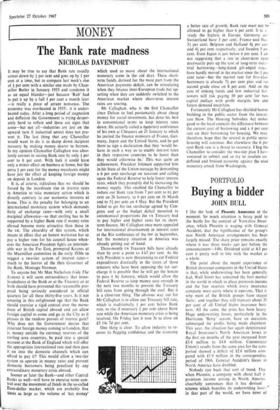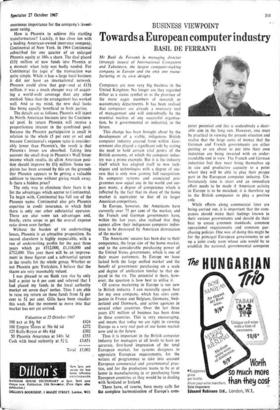Buying a bidder
PORTFOLIO JOHN BULL
I like the look of Phoenix Assurance at the moment. So much attention is being paid to the battle for the control of Yorkshire Insur- ance, which Phoenix is waging with General Accident, that the significance of the group's new North American arrangements has been largely missed. The share price remains exactly where it was three weeks ago just before the announcement-140s. Dividend yield at 4.5 per cent is pretty well in line with the market as a whole.
The point about the recent experience of British insurance companies in the United States is that, while underwriting has been generally bad, Wall Street has remained the best market in the world in which to place premium income and the free reserves which every insurance company must carry where it operates. That is why most of the British groups have stayed there: and together they still transact about 20 per cent of all United States insurance busi- ness. All the same, the price has been heavy Huge underwriting losses, particularly in the Hurricane 'Betsy' season, have on occasions submerged the profits being made elsewhere This year, the situation has again deteriorated Royal Insurance's North American losses in the first six months of the year increased frorr f3.4 million to £4.8 million. Commercial Union's results from the same area for the same period showed a deficit of £2.6 million coin pared with £1.9 million in the corresponding period of 1966. General Accident's losses in North America have doubled.
Nobody can buck that sort of trend. Thu- when Phoenix, a company with about half it premium income arising in North America cheerfully announces that it has devised scheme which banishes its underwriting losses' in that part of the world, we have news of
enormous importance for the company's invest- ment rating.
How is Phoenix to achieve this startling transformation? Luckily, it has close ties with a leading American-owned insurance company, Continental of New York. In 1964 Continental subscribed for one quarter of an enlarged Phoenix equity at 180s a share. The deal placed £133 million of new funds into Phoenix at a moment when help was badly needed. For Continental the logic o' the transaction was quite simple. While it hao a large local business it did not have an international network.
Phoenix could close that gap—and at £133 million, it was a much cheaper way of acquir- ing a world-wide coverage than any other method. Since then the arrangement has worked well. And to my mind, the new deal looks like being equally beneficial to both parties.
The details are as follows. Phoenix will inject its North American business into the Continen- tal pool. In return Phoenix will receive a proportionate interest in the combined pool. Because the Phoenix participation is small in relation to the whole (5 per cent or so) and because Continental's expense ratio is consider- ably lower than Phoenix's, the result is that Phoenix's losses are absorbed. Taking into account the small drop in Phoenix's Wall Street income which results, its all-in American posi- tion should improve by £13 million. Some sus- picion has been aroused by this on the grounds that Phoenix appears to be getting a valuable addition to income without giving much away. Is there a hidden price?
The only way to eliminate these fears is to list the advantages which accrue to Continental.
To begin with, Continental has full use of the Phoenix name. Continental also gets Phoenix expertise in credit insurance, in which field there is only one other substantial operator. There are also some tax advantages and, finally, extra scope to get the overall expense ratio down even further.
Without the burden of us underwriting losses, Phoenix is an attractive proposition. Its record elsewhere is highly respectable, with a
run of underwriting profits for the past three years which go £512,000, £1,116,000 and £752,000. This year there will be an improve- ment in these figures and a substantial upturn in the results for the whole group. Whether or not Phoenix gets Yorkshire, I believe that the shares are very reasonably valued.
I was pleased to see Bank rate rise by only half a point to 6 per cent and relieved that I had placed my funds in the local authority market on seven days' notice. Thus I am able to raise my return on these funds from 51 per cent to 5-k per cent. Gilts have been steadier this week. But the moment to move into that market has not yet arrived.
Valuation at 25 October 1967 100 Bar at 841 9d £424 100 Empire Stores at 56s 6d xd £272 125 Rolls-Royce at 48s 44d £302 50 Phoenix Assurance at 141s 3d £353
Cash with local authority at 51%
£3,651 Total £5,002











































 Previous page
Previous page